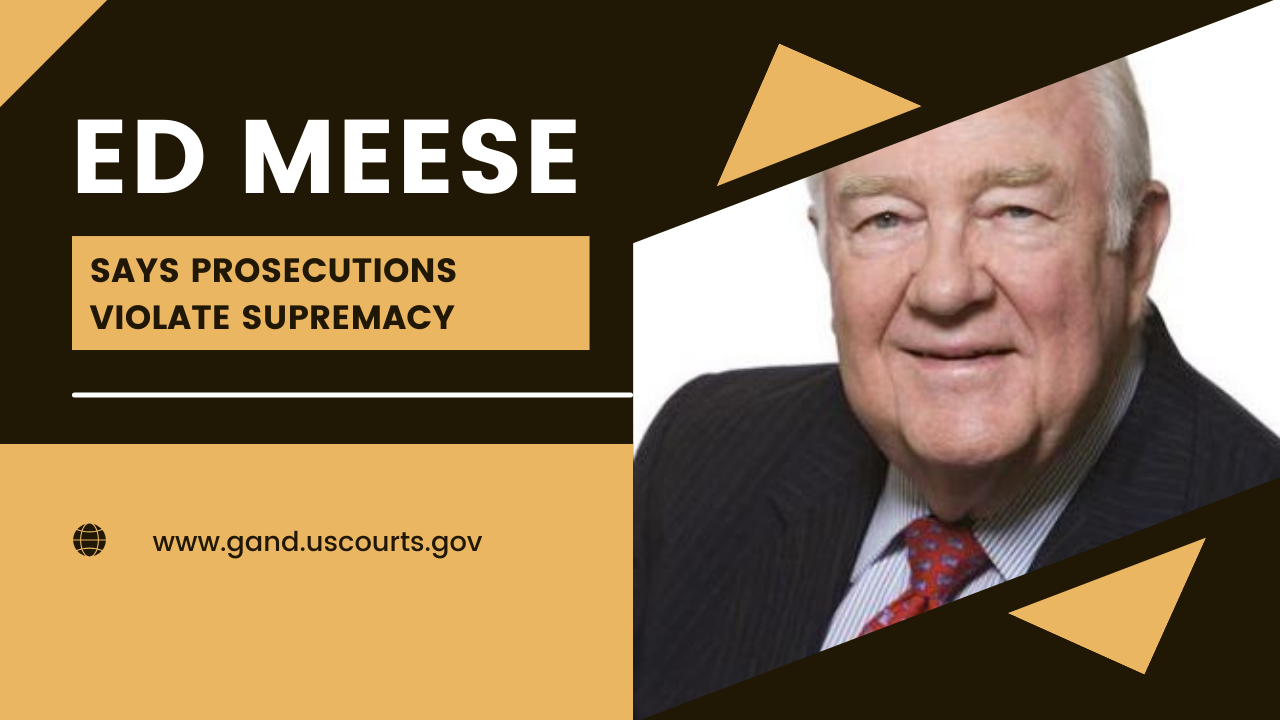Constitution
Edwin Meese, former AG, asserts prosecution of Trump violates Supremacy Clause
Edwin Meese, former Attorney General under Reagan, asserts prosecuting federal officials by State courts violates federal supremacy.

On Saturday September 16, Edwin Meese, former Attorney General under President Ronald W. Reagan, filed an affidavit asserting that the prosecution of President Trump and one of his last acting Attorneys General, Jeffrey B. Clark, violates the Supremacy Clause and would be non-prosecutable even in a federal court.
The Edwin Meese affidavit
Edwin Meese filed his affidavit in the U.S. District Court for the Northern District of Georgia (Atlanta Division). Former President Donald J. Trump and eighteen other associates are under indictment in Georgia for challenging the Election of 2020. Several of Trump’s co-defendants have filed Notices of Removal in District Court, to have that court, not the Fulton County Superior Court, try their cases. Among these is Jeff Clark, originally appointed as an Assistant Attorney General and, toward the end, Acting Attorney General. (See the docket page on CourtListener for the Clark Notice of Removal.) Clark filed his Notice on August 21, 2023. (Mark Meadows, former Chief of Staff for Trump, has filed a similar Notice.)
Judge Steve CarMichael Jones, an Obama appointee, is handling this Notice. He has already ruled that the facts do not warrant “summary remand” (i.e., dismissal of the Notice).
Edwin Meese submitted a 20-page affidavit with 115 pages of supporting documents attached to it. Whether Judge Jones will let it stand, is not clear, as Meese apparently filed no Motion for Leave To File.
Key points of the affidavit
Meese begins with his credentials detailing his years of service to President Reagan and his tenure at the Heritage Foundation. He then makes the following points:
- An Assistant Attorney General, once appointed, need not confine his activities to the particular division at issue during his confirmation. So any suggestion, like that in the indictment, that Clark went beyond his brief, is groundless.
- Mr. Clark’s letter suggesting that the Justice Department change its position on the Election of 2020 does not constitute fraud. In fact the President is within his Constitutional authority to ask for an officer’s opinion. See Article II Section 2 Clause 1 (“the Opinion Clause”).
- Similarly, Mr. Clark, if he were Acting Attorney General (as the “January 6 Committee” asserts), had full authority to speak to the President directly on a point of law. And finally:
- State courts do not prosecute federal officers for acts they take in the course of their federal duties. Any such prosecution violates the Supremacy Clause of the Constitution.
This filing first came to CNAV’s attention from this post on X by a self-described Tea Party movement founder.
In reaction to that post, users either extol it or condemn it, but no one, thus far, is brushing it off.
Terry A. Hurlbut has been a student of politics, philosophy, and science for more than 35 years. He is a graduate of Yale College and has served as a physician-level laboratory administrator in a 250-bed community hospital. He also is a serious student of the Bible, is conversant in its two primary original languages, and has followed the creation-science movement closely since 1993.
-

 Guest Columns4 days ago
Guest Columns4 days agoData Centers Are a Repeat of History in PA’s Coal Region
-

 Executive4 days ago
Executive4 days agoWaste of the Day: Secret Settlements get Taxpayer Money
-

 Executive5 days ago
Executive5 days agoWaste of the Day: Throwback Thursday – Americans Lead Moroccan Pottery Classes
-

 Civilization4 days ago
Civilization4 days agoThe Northwest Passage Will Be Decided by Capability, Not Law
-

 Accountability14 hours ago
Accountability14 hours agoWaste of the Day: Principal Bought Lobster with School Funds
-

 Constitution5 hours ago
Constitution5 hours agoTrump, Canada, and the Constitutional Problem Beneath the Bridge
-

 Civilization3 days ago
Civilization3 days agoThe devil is in the details
-

 Executive2 days ago
Executive2 days agoThe Israeli Lesson Democrats Ignore at Their Peril










